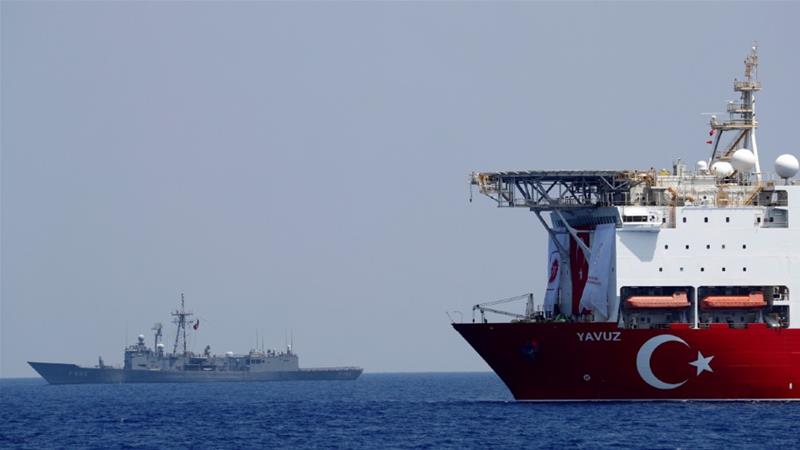
Territorial disputes have brought Greece and Turkey to the edge of armed conflict more than once in the past 50 years, but in recent months, sparring between the two states has reached a fever pitch. Most recently, on 28 August 2020, during Greek-led military exercises, Turkish fighters jets pursued Greek aircraft that approached a Turkish-designated no-fly zone.
The crux of the current escalation is maritime boundaries and resource rights in the Aegean and east Mediterranean. While these disputes are long-standing, substantial gas and oil discoveries in the eastern Mediterranean over the past decade have made the demarcation of exclusive economic zones (EEZs) more pressing, with both Turkey and Greece redoubling efforts to support their competing claims.
In 2018, Greece proposed an ambitious project for a pipeline from the Israeli fields to Italy, via Cyprus and Crete, to supply gas to southern Europe. Aside from the exorbitant costs of the project, it is doubtful whether the European market needs additional gas beyond that supplied by the near-completed Turkish pipeline carrying gas from Russia and Azerbaijan. Despite the questionable feasibility, Egypt—whose own relations with Turkey are tense—joined the project talks. In January 2019, Egypt, Greece, Cyprus, Israel and Italy formed the EastMed Gas Forum; Turkey was not invited to join.
In response, in November 2019, Turkey concluded an EEZ with the Libyan Government of National Accord that put a large part of the area between Crete and Cyprus in Turkey’s EEZ and separates Israel and Cyprus’s EEZs. The agreement sparked angry reactions from Athens, which called it illegal.
In the wake of its agreement with Libya, Turkey stepped up its exploration in areas it deemed part of its EEZ, dispatching armed naval escorts with its drilling ships. Turkish exploration in the seas between Crete and Cyprus in July 2020 incensed Greece, which sought support from the US and EU. Following intervention by German Chancellor Angela Merkel, Turkey agreed to suspend exploration in the disputed zone as a gesture of good faith, pending direct negotiations with Greece. As the groundwork was being laid for negotiations, Greece announced it had concluded an EEZ with Egypt, angering Turkey and prompting it to backtrack on its vow to suspend exploration.
Is this escalating series of actions and reactions leading to open warfare or can the conflict be resolved by other means?
The Turkish-Greek conflict over maritime borders is unlike any other in the world. Not only does it involve potentially vast wealth under the seabed in the Aegean and the eastern Mediterranean, it relies on diverse and competing legal sources and interpretations. Ultimately, however, Greece’s legal case looks weaker than Turkey’s. Greece demarcates its EEZ to include all the Greek islands, including those located hundreds of kilometers from its mainland and just off the Turkish coast, claiming a continental shelf for these islands—a claim that Turkey disputes. But in several cases not involving archipelago nations, the International Court of Justice has not recognized a continental shelf for islands. Moreover, Greece’s EEZs with both Egypt and Italy implicitly cede this point, drawing the zones’ borders from the Greek mainland, not the islands.
Whatever the merit of these arguments, the dispute is unlikely to be resolved by law and logic, but balance of powers considerations, and here, Turkey outweighs Greece on every measure—economic, human resources, and military and naval forces. With Turkey’s discovery of a gas field in the Black Sea that will meet domestic demand for six years, Ankara can afford to play the long game, imposing its interpretation of its EEZ, until Athens is persuaded to come to the negotiating table without preconditions.
Recognizing its weaker position, Greece is attempting to build broad alliances against Turkey, but there are signs that its support is shrinking. For purely pragmatic reasons, neither Israel nor Egypt want an armed confrontation with Turkey, and both countries refrained from participating in the Greek military exercises in late August. While France, wary of Turkey’s growing influence in Libya, has been vocal in its support for Greece, and might support EU sanctions against Ankara, Turkey also has friends in the EU and could likely withstand the sanctions. In any case, France has no standing in the eastern Mediterranean.
Negotiations are the safest route out of the crisis, but the problem is that there is no existing mechanism for Greek-Turkish talks since Greece unilaterally suspended the Bern talks in 1981. It will be up to Germany to continue its efforts to devise some mechanism and maintain the possibility of negotiations.
Until then, even if neither Ankara nor Athens has any intention of starting a war, any misstep could spark an armed conflagration, with dire consequences for both countries and Mediterranean security as a whole.
*This is a summary of a policy brief originally written in Arabic, available here: https://studies.aljazeera.net/ar/article/4777